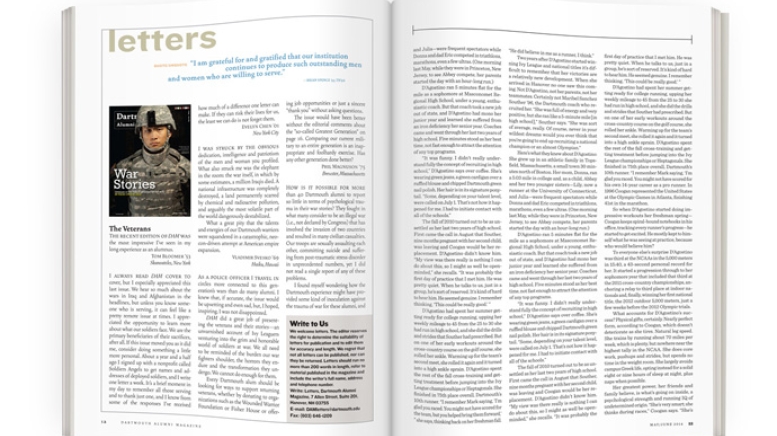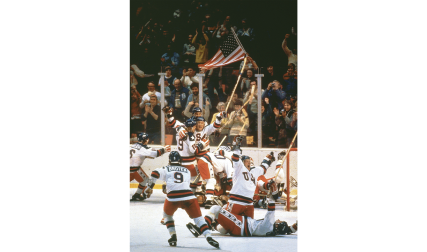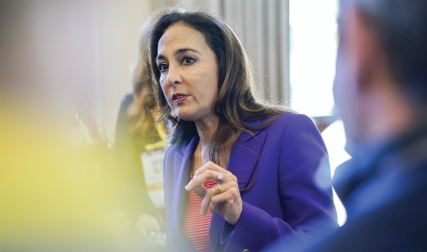The recent edition of DAM was the most impressive I’ve seen in my long experience as an alumnus.
Tom Bloomer ’53 Skaneateles, New York
I always read DAM cover to cover, but I especially appreciated this last issue. We hear so much abou t the wars in Iraq and Afghanistan in the headlines, but unless you know someone who is serving, it can feel like a pretty remote issue at times. I appreciated the opportunity to learn more about what our soldiers face. We are the primary beneficiaries of their sacrifices, after all. If this issue moved you as it did me, consider doing something a little more personal. About a year and a half ago I signed up with a nonprofit called Soldiers Angels to get names and addresses of deployed soldiers, and I write one letter a week. It’s a brief moment in my day to remember all those serving and to thank just one, and I know from some of the responses I’ve received how much of a difference one letter can make. If they can risk their lives for us, the least we can do is not forget them.
Evelyn Chen ’01 New York City
I was struck by the obvious dedication, intelligence and patriotism of the men and woman you profiled. What also struck me was the elephant in the room: the war itself, in which by some estimates, a million Iraqis died. A national infrastructure was completely destroyed, a land permanently scarred by chemical and radioactive pollution, and arguably the most volatile part of the world dangerously destabilized. What a great pity that the talents and energies of our Dartmouth warriors were squandered in a catastrophic, neocon-driven attempt at American empire expansion.
Vladimir Svesko ’69 Haiku, Hawaii
As a police officer I travel in circles more connected to this generation’s wars than do many alumni. I knew that, if accurate, the issue would be upsetting and even sad, but, I hoped, inspiring. I was not disappointed. DAM did a great job of presenting the veterans and their stories—an unvarnished account of Ivy Leaguers venturing into the grim and honorable world of soldiers at war. We all need to be reminded of the burden our war fighters shoulder, the horrors they endure and the transformation they undergo. We cannot do enough for them. Every Dartmouth alum should be looking for ways to support returning veterans, whether by donating to organizations such as the Wounded Warrior Foundation or Fisher House or offering job opportunities or just a sincere “thank you” without asking questions. The issue would have been better without the editorial comments about the “so-called Greatest Generation” on page 16. Comparing our current military to an entire generation is an inappropriate and foolhardy exercise. Has any other generation done better?
Phil Magnuson ’75 Brewster, Massachusetts
How is it possible for more than 40 Dartmouth alumni to report so little in terms of psychological trauma in their war stories? They fought in what many consider to be an illegal war (i.e., not declared by Congress) that has involved the invasion of two countries and resulted in many civilian casualties. Our troops are sexually assaulting each other, committing suicide and suffering from post-traumatic stress disorder in unprecedented numbers, yet I did not read a single report of any of these problems. I found myself wondering how the Dartmouth experience might have provided some kind of inoculation against the trauma of war for these alumni, and then I read the letter from Dan Anzel ’55 who described the brutally sadistic and humiliating hazing that caused him to de-pledge his fraternity [“Letters,” July/Aug]. This reminded me that thousands of Dartmouth men (I can’t speak for the women) have been exposed to such brutality at the hands of upperclassmen, both inside and outside fraternities. Any public acknowledgement of these traumatic experiences has been extremely rare. Perhaps this tradition of stoicism and secrecy has made it equally rare for the trauma of war to be acknowledged, especially in public. Lest the old traditions fail—at least this one.
John Rhead ’67 Columbia, Maryland
I had mixed feelings reading the Sept/Oct issue. On the one hand the stories confirmed my appreciation of the military as a great place for young people to test their mettle; on the other, believing as I do our engagements in Afghanistan and Iraq constitute aggression—the “supreme international crime,” according to the Nuremberg tribunal—I have to view these decent, intelligent, brave young men and women as war criminals. That the justness of our many wars is seldom addressed is exemplified by the words of Capt. Jon Vaccaro ’06, who said “the way we’ve gone into these wars” didn’t matter to him. Is that putting a Dartmouth education to good use? Just what did we teach him about honor, duty, basic human decency? As the thought-drowning beat of the drums of war is likely to crescendo, it would be good for all of us to reflect on the legality of an über alles foreign policy that destroys the homes, lives and souls of not just the victims of our aggression but, as several of the soldiers’ narratives attest, the aggressors as well.
Ken Meyercord ’66 Reston, Virginia
[Editor’s note: Vaccaro’s quote was: “People have problems with the way we’ve gone into these wars, but it didn’t matter to me whether I agreed with that or not. I felt I could influence my own little bubble, which was better than sitting at home and not doing that.”] My sincere thanks for the most recent issue of DAM, which I get secondhand from a local alum. It is, to my mind, the finest issue you have published. I hope it will be read widely beyond your alums—especially by those we select to make decisions at home and abroad regarding wars.
George Pisani Lawrence, Kansas
As the son of Vietnam War veteran Robert Spence ’66, who served in the Marine Corps, I am pleased that recognition has been awarded those who have made the difficult, selfless (and unfortunately necessary) decision to serve in a time of conflict. It is imperative that within our College’s diverse community we continue to recognize these heroes amongst us for their sacrifices within current and past conflicts. I am grateful for and gratified that our institution continues to produce such outstanding men and women who are willing to serve. To all of them we all owe a deep debt of gratitude.
Brian Spence ’95, Th’96 Orford, New Hampshire
That was a good issue honoring Dartmouth vets by allowing them to speak of their experiences, offer their opinions and provide a perspective lost to those at home. During the Vietnam War it was the opinions of the College faculty, students on campus and the ACLU that mattered, not the opinions or stories of those of us who went. Maybe other vets were asked for theirs. I never was. Instead, as I recall, the efforts of Dartmouth grads in uniform were honored by student demonstrations and by the dropping of ROTC by the administration, which I saw as painful, unforgivable slaps and still do. I’ve wanted little to do with the College since then. I extend my thanks and admiration to every one of those Dartmouth men and women featured.
Bruce Miller ’65 Raleigh, North Carolina
As a Navy ROTC grad who served as a naval aviator in Vietnam, I enjoyed reading about alums who realize that “freedom isn’t free” while reflecting on how different their experiences have been compared to the Vietnam era when veterans were marginalized. At our graduation, valedictorian Jamie Newton ’68, a Quaker, gave a strongly worded antiwar speech. Many of the audience stood on their chairs, screaming in anger at what he said. The next day our graduation was on the front page of The New York Times. Newton could say what he wanted because that freedom was paid for by the service of veterans. Although some may argue that we now have a “professional” military, I believe the current system is far better than the draft. I applaud the current veterans for their service and am honored to have them as fellow veterans and alumni.
Andrew J. Hotaling ’68 Hinsdale, Illinois
DAM’s recognition of veterans of America’s most recent wars is its most meaningful accomplishment in years. In the 1950s during the peace between the Korean armistice and our initial engagement in Vietnam, Dartmouth’s ROTC program produced several hundred officers every year. Many of us chose ROTC over chancing the draft, while many managed to avoid military service. The Vietnam period changed everything at Dartmouth and other Ivies that largely branded ROTC and military service with self-righteous contempt. It is gratifying to know that recent alumni have served in the armed forces, and that the ROTC program, however small, continues Dartmouth’s old tradition in defense of the nation.
Michael Wygant ’58 Scarborough, Maine
Dare I hope that you will, someday soon, give equal recognition to those of us who served in Vietnam? One of my classmates earned a Silver Star and two Distinguished Flying Crosses (DFC). I earned a DFC and 15 Air Medals during my two tours (volunteered for both). I know that Dartmouth would like to forget Vietnam—there was much bad behavior among the students in those days and the administration pretty much caved in to their demands. But you really shouldn’t ignore us.
Stephen E. Katz ’56 Rancho Palos Verdes, California
Dartmouth veterans’ honorable motivations for serving are clear. Yet, with no intention to demean or draw full parallels, I’ll point out that their reasons are identical to positive motivations that prompt people to join militant groups in the Middle East. Negative, aggressive, illegitimate motivations—such as hatred and greed—and positive, defensive, legitimate motivations—such as selfless desires to defend life and freedom and to seek camaraderie, teamwork, adventure and noble purpose—all reside on each side of war. Moreover, while war highlights one front of conflict, multiple fronts of conflict lurk within each side. Conflict is not good vs. evil, black vs. white; conflict is like a piano, with black and white keys intermixed. Because war adds to the injustices, deprivations and psychological scars that aggravate aggressive and defensive roots of violence, war, as a tool against cruelty and injustice, is ineffective. The Taxonomy of Peace, a 10-year project I worked on with six others from Dartmouth (http://sites.google.com/site/paradigmforpeace), finds that destructive action is a thin slice in the total pie of options. Most veterans expressed no enthusiasm for destructive action: They were proud of preserving life. Several wrote of constructive actions: understanding culture, negotiating between warlords, forging genuine social links, providing healthcare, electricity and a police force. Could it have been more effective to activate Dartmouth vets’ talents in Afghanistan and Iraq without the wars?
Kristin (Young) Christman ’90 Clifton Park, New York
America must never start or generate a war. We should have a strong military to defend our nation and we should thank God for the courageous, patriotic men and women who volunteer to serve. But war must never be an instrument of foreign policy or commercial interests. Offensive war is rightly condemned by a soldier’s conscience. The only sensible and honorable foreign policy for America is strict neutrality. That means nonalliance, nonintervention and no meddling in the internal affairs of other nations. It means free and fair trade with all who want it, friendly relations with all who want that and a strong national defense, including properly supervised intelligence operations, against those who do not want friendly relations. Our nation also should stop acting as policeman of the world and withdraw from all military treaties, including NATO, so we are not drawn into war by proxy. America has 200,000 troops stationed at 800 bases in 140 countries around the world, but we can’t control our own borders. What’s wrong with this picture?
John White ’61 Cheshire, Connecticut




